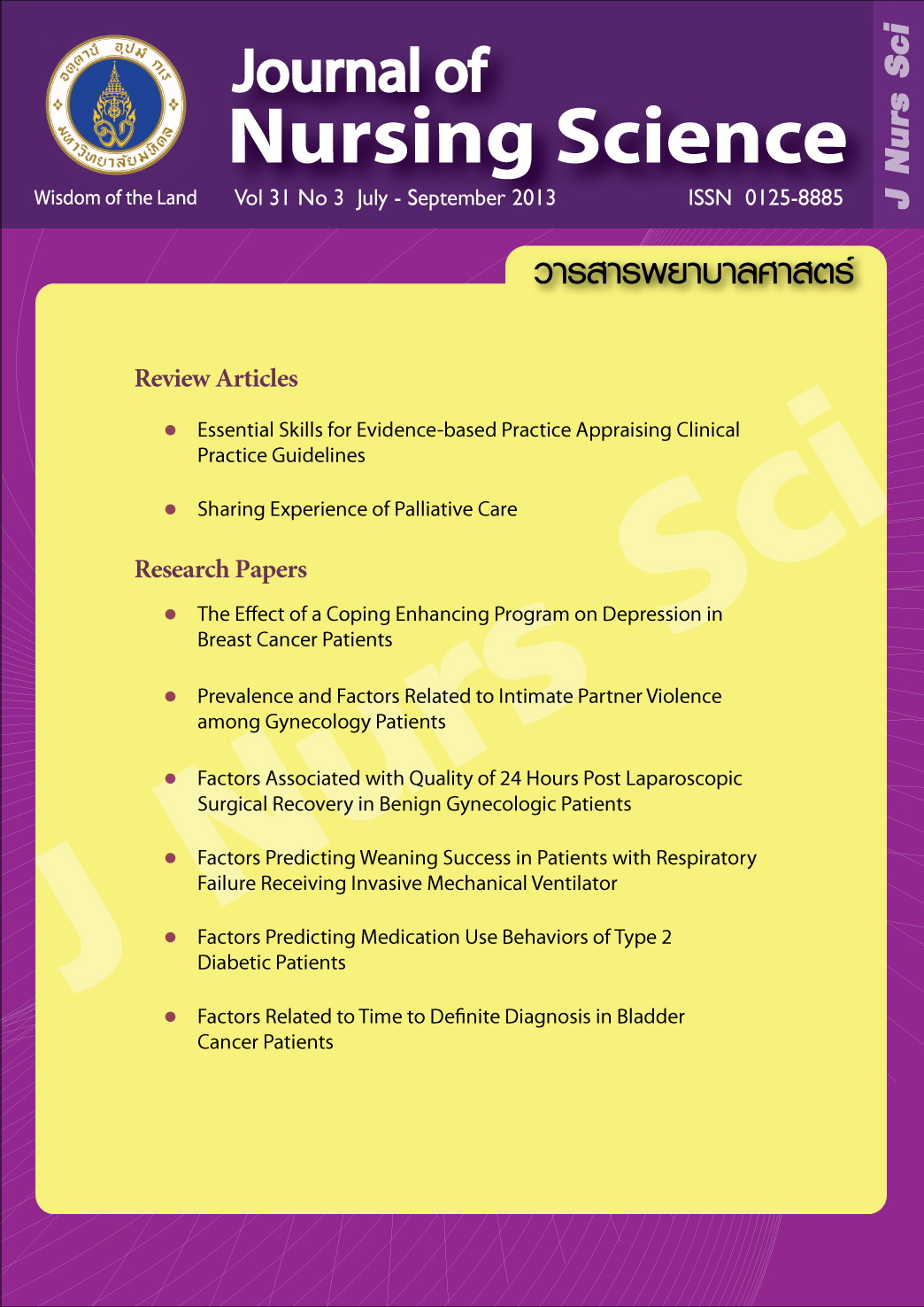The Effect of a Coping Enhancing Program on Depression in Breast Cancer Patients
Main Article Content
บทคัดย่อ
Purpose: The study was aimed at investigating the effect of a coping enhancing program on depression in breast cancer patients.
Design: Randomized controlled trial.
Methods: The study sample consisted of patients being informed of their diagnosis of breast cancer. They were treated for the first or second time with postoperative chemotherapy at a chemotherapy center in a tertiary hospital. The total number of subjects was 56 and randomly assigned to an experimental and a control groups with 28 each. The experimental group received the coping enhancing program for breast cancer patients. The program was composed of two individual counseling sessions conducted at the hospital, and four telephone visits. The control group received routine nursing care from the hospital. The subjects’ depression was assessed using the Center for Epidemiologic Studies-Depression Scale: CES-D, both before and after the experiment. Data were analyzed using descriptive statistics, chi-square test, and t-test, with the significance level at .05.
Main fidings: The study result revealed that the post-test depression mean score of the experimental group (x = 6.607, SD = 2.819) was lower than that of the control group (x = 17.714, SD = 7.605) with statistical significance (p < .001).
Conclusion and recommendations: The coping enhancing program was effective for reducing depression in breast cancer patients post operation. This program should be encouraged to implement in this group of patients. Nurses who provide this program should also be trained for problem solving
counseling.
ผลของโปรแกรมส่งเสริมการเผชิญความเครียดต่ออาการซึมเศร้าในผู้ป่วยมะเร็งเต้านม
นุชจรี หยองทอง, อติรัตน์ วัฒนไพลิน, อัจฉราพร สี่หิรัญวงศ์, ประภา ยุทธไตร
บทคัดย่อ
วัตถุประสงค์: เพื่อศึกษาผลของโปรแกรมส่งเสริมการเผชิญความเครียดต่ออาการซึมเศร้าในผู้ป่วยมะเร็งเต้านม
รูปแบบการวิจัย: การวิจัยเชิงทดลอง
วิธีดำเนินการวิจัย: กลุ่มตัวอย่างเป็นผู้ป่วยนอกที่ได้รับการวินิจฉัยว่าเป็นมะเร็งเต้านมและทราบผลการวินิจฉัยมารับการรักษาด้วยเคมีบำบัด ภายหลังการผ่าตัด ที่ศูนย์เคมีบำบัด โรงพยาบาลแห่งหนึ่ง เป็นครั้งแรกหรือครั้งที่สองจำนวน 56 คน ซึ่งได้รับการสุ่มเข้ากลุ่มทดลองและกลุ่มควบคุม กลุ่มละ 28 คน กลุ่มทดลองได้รับโปรแกรมส่งเสริมการเผชิญความเครียดในผู้ป่วยมะเร็งเต้านม เป็นการให้การปรึกษารายบุคคลแบบพบหน้ากันที่โรงพยาบาลจำนวน 2 ครั้ง และผ่านทางโทรศัพท์จำนวน 4 ครั้ง ส่วนกลุ่มควบคุมได้รับการพยาบาลตามปกติ ประเมินด้วยแบบประเมินอาการซึมเศร้า Center for Epidemiologic Studies-Depression Scale: CES-D ก่อนและหลังการทดลอง วิเคราะห์ข้อมูลโดยใช้สถิติพรรณนาไคร์สแควร์ และการทดสอบที กำหนดระดับนัยสำคัญทางสถิติ .05
ผลการวิจัย: ภายหลังการทดลองผู้ป่วยมะเร็งเต้านม กลุ่มทดลองมีค่าเฉลี่ยคะแนนอาการซึมเศร้า (x = 6.607, SD = 2.819) น้อยกว่ากลุ่มควบคุม (x = 17.714, SD = 7.605) อย่างมีนัยสำคัญทางสถิติ (p < .001)
สรุปและข้อเสนอแนะ: โปรแกรมส่งเสริมการเผชิญความเครียดในผู้ป่วยมะเร็งเต้านมสามารถ ลดอาการซึมเศร้าในผู้ป่วยมะเร็งเต้านมระยะแรกภายหลังการผ่าตัดได้ บุคลากรทางการพยาบาลจึงควรส่งเสริมการนำโปรแกรมฯ ไปใช้ในการดูแลผู้ป่วยมะเร็งเต้านมดังกล่าว และพยาบาลควรผ่านการอบรมและฝึกทักษะการให้การปรึกษาเพื่อส่งเสริมการแก้ปัญหาก่อนนำโปรแกรมฯ ไปใช้
คำสำคัญ: มะเร็งเต้านม การเผชิญความเครียด อาการซึมเศร้า
Article Details
ลิขสิทธิ์: วารสารพยาบาลศาสตร์เป็นเจ้าของลิขสิทธิ์ในการเผยแพร่ผลงานที่ตีพิมพ์ ห้ามผู้ใดนำบทความที่ได้รับการตีพิมพ์ในวารสารพยาบาลศาสตร์ไปเผยแพร่ในลักษณะต่างๆ ดังต่อไปนี้ การส่งบทความไปตีพิมพ์เผยแพร่ที่อื่น การนำบทความเผยแพร่ออนไลน์ การถ่ายเอกสารบทความเพื่อกิจกรรมที่ไม่ใช่การเรียนการสอน ยกเว้นเสียแต่ได้รับอนุญาตจากวารสารพยาบาลศาสตร์

Disclaimer: เนื้อหาบทความหรือข้อคิดเห็นใดๆ ในวารสารพยาบาลศาสตร์ ถือเป็นความรับผิดชอบของผู้เขียน กองบรรณาธิการไม่จำเป็นต้องเห็นด้วยและไม่มีส่วนรับผิดชอบแต่อย่างใด


